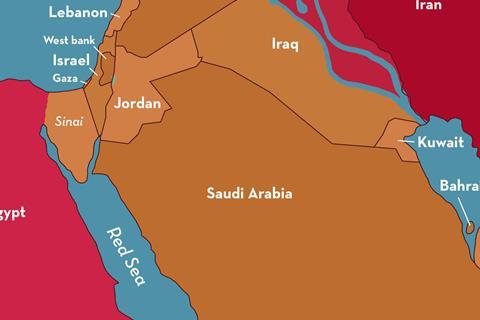God makes promises to both Jews and Arabs when it comes to land in the Middle East, observes David Instone Brewer

Protesters all over the world are chanting “from the river to the sea” a slogan that has been criticised as antisemitic, and yet it is a good summary of two land allocations made by God in the Old Testament. Israel was given the land from the River Jordan to the Mediterranean Sea but, before that, God first promised that all of Abraham’s descendants (including Arabs) could live in the land from the River Euphrates to the Red Sea (Genesis 15:18). This promise has been remarkably fulfilled.
Two promises
The land given to Abraham includes the area currently occupied by Syria, Lebanon, Jordan, Iraq, Saudi Arabia and Sinai bedouins. Today, some extremist Jews regard all this land as their inheritance, but the Promised Land given to Israel had rather smaller borders. Numbers 34:3-15 describes the borders from Mount Hor (Mount Hermon), about 40 miles north of the Sea of Galilee down to the southern end of the Dead Sea, and from the River Jordan to the Mediterranean – ie roughly the size of modern Israel.
God made a separate promise for all of Abraham’s descendants, including Ishmael’s (the Arabs) as well as the Jews. And today, the land allotted to Abraham 4,000 years ago almost exactly delineates where those who claim descent from Abraham still live.
Muslims living outside those borders trace their heritage elsewhere. Beyond the Euphrates valley is Iran, which has a noble Persian heritage, and beyond the Red Sea are the people of Egypt who celebrate a heritage much older than Ishmael. North of this area, the people of Turkey rightly regard themselves as descendants of a culture that spread the agricultural revolution all the way to Britain before Abraham’s day. However, those living today within the area promised to Abraham all proudly regard Abraham as their ancestor.
Conditional benefits
But didn’t God say that this promise depended on circumcision? Abraham was told: “Any uncircumcised male, who has not been circumcised in the flesh, will be cut off from his people; he has broken my covenant.” (Genesis 17:14). That’s why all Jewish boys are circumcised – it’s so important that it can even be done on a Sabbath.
Arabs descended from Abraham still circumcise their sons, but this isn’t an Islamic practice taught in the Koran or Hadith (early Islamic teachings); it was something that was already practised when Mohammed started the new religion. He declared circumcision was sunnah – ‘allowed’ but not compulsory. So non-Arabic Muslims tend to remain uncircumcised, even though Mohammed (as Arab himself) was circumcised.
God knew Israel would have a significant future and this would cause friction
No one knows when Arabs started to practise circumcision, but they didn’t learn it from their neighbours. It wasn’t a custom of other ancient nations – except for priests in Egypt – and some civilisations actively disparaged it. Greeks despised it because it mutilated the perfect human form. And uncircumcised nude statues were displayed proudly in Roman courtyards.
Unlike the children of Israel, Arab nations have never been removed from their land. Of course, the only stipulation God gave them was to continue circumcising their boys, while Israel had many more commandments to keep in order to stay in the land. For example, they were forbidden from harvesting the land during the Sabbath years (Leviticus 25:3-4), though God held off punishment for hundreds of years (see 2 Chronicles 36:21). They were also exiled for mistreating the poor (Amos 5:11-27) and for pagan worship which even included male prostitutes in the temple itself (2 Kings 23:4-11), for which God ‘divorced’ them (Jeremiah 3:8).
Trouble ahead
God’s covenant with the Arabs is somewhat obscured in most Bible translations, because of tricky grammar. When Abraham heard the good news about Sarah’s son, he implored God not to forget his promise to Ishmael: “If only Ishmael might live under your blessing!” God answered, “Yes, but your wife Sarah will bear you a son” (Genesis 17:19 NIV). In other words: “Yes, Ishmael will inherit, but Isaac will also.”
Many Bible versions translate God’s reply differently: “No, but Sarah your wife shall bear you a son” (ESV) – which suggests the covenant is no longer with Ishmael; only with Isaac. Others are more ambiguous: “And God said, Sarah thy wife shall bear thee a son indeed” (KJV).
The differences arise because of the Hebrew word aval which means: “Yes, but…” It is an affirmation that implies a problem. There isn’t really an equivalent English word, so elsewhere it is translated “however”, “nevertheless” or just “but” (eg 2 Chronicles 33:17; Ezra 10:13).
In other words, God foresaw problems. He affirmed his previous promise concerning all Abraham’s descendants, but he knew Israel would have an even more significant future and this would cause friction. God promised Israel only the land from the Mediterranean to the Jordan because he didn’t want to retract the bigger promise he’d given: that the Red Sea to the Euphrates was for all Abraham’s descendants.
The two boys Ishmael and Isaac fought – like most brothers. Perhaps these were good-natured scuffles – the Hebrew word has a wide meaning, including ‘sporting’ with your wife (tsachat – see Genesis 21:9; 26:8, 39:14). But Galatians 4:29 affirms the tradition that Ishmael “persecuted” his younger brother. Sarah demanded that Ishmael and his mother must leave. God promised that this wouldn’t affect Ishmael’s inheritance of land, so Abraham agreed (21:12-13).
The brotherly rivalry and competition has continued to this day, with increasing belligerence and violence between Jews and Arabs. The fact that God foresaw this doesn’t excuse it.






































No comments yet